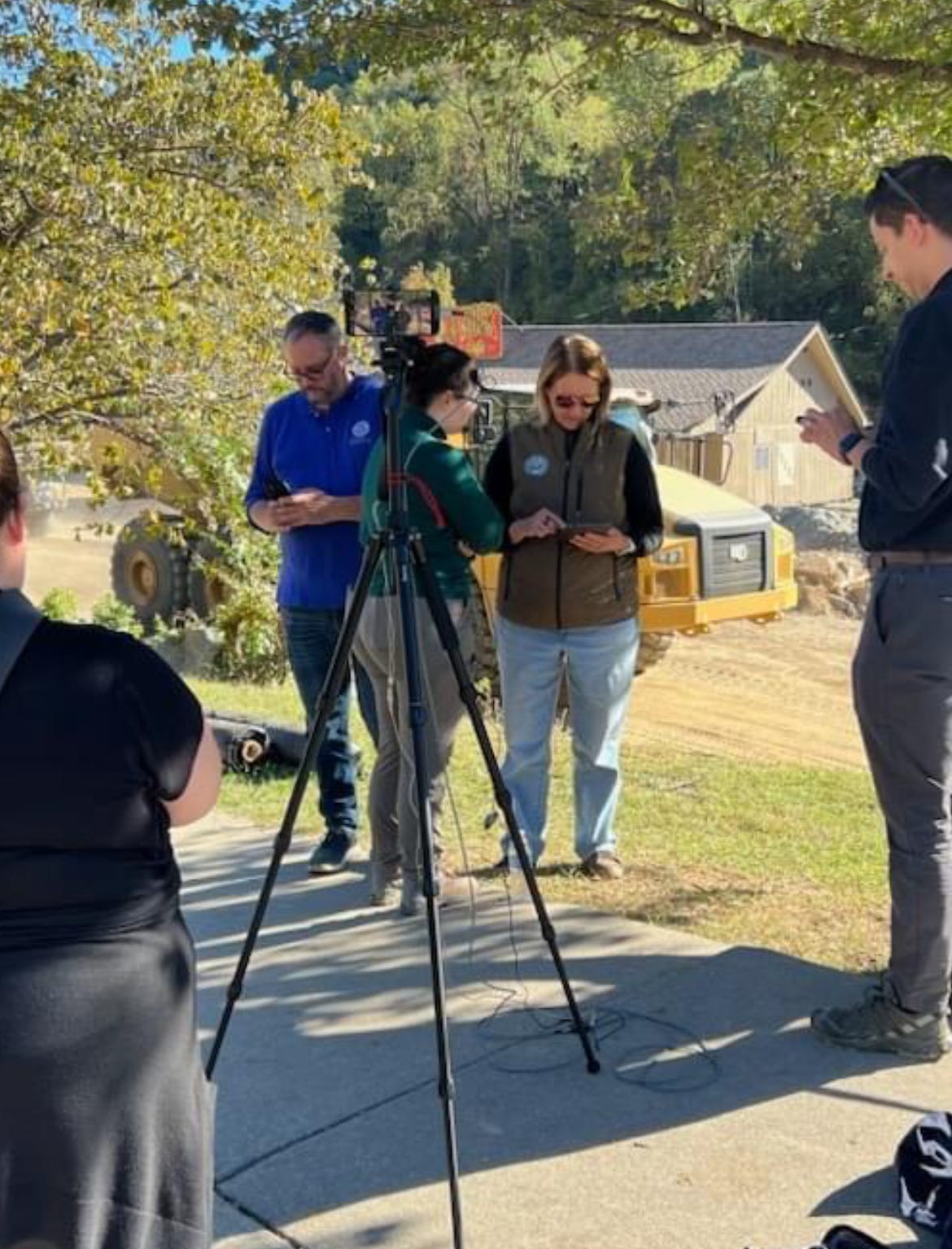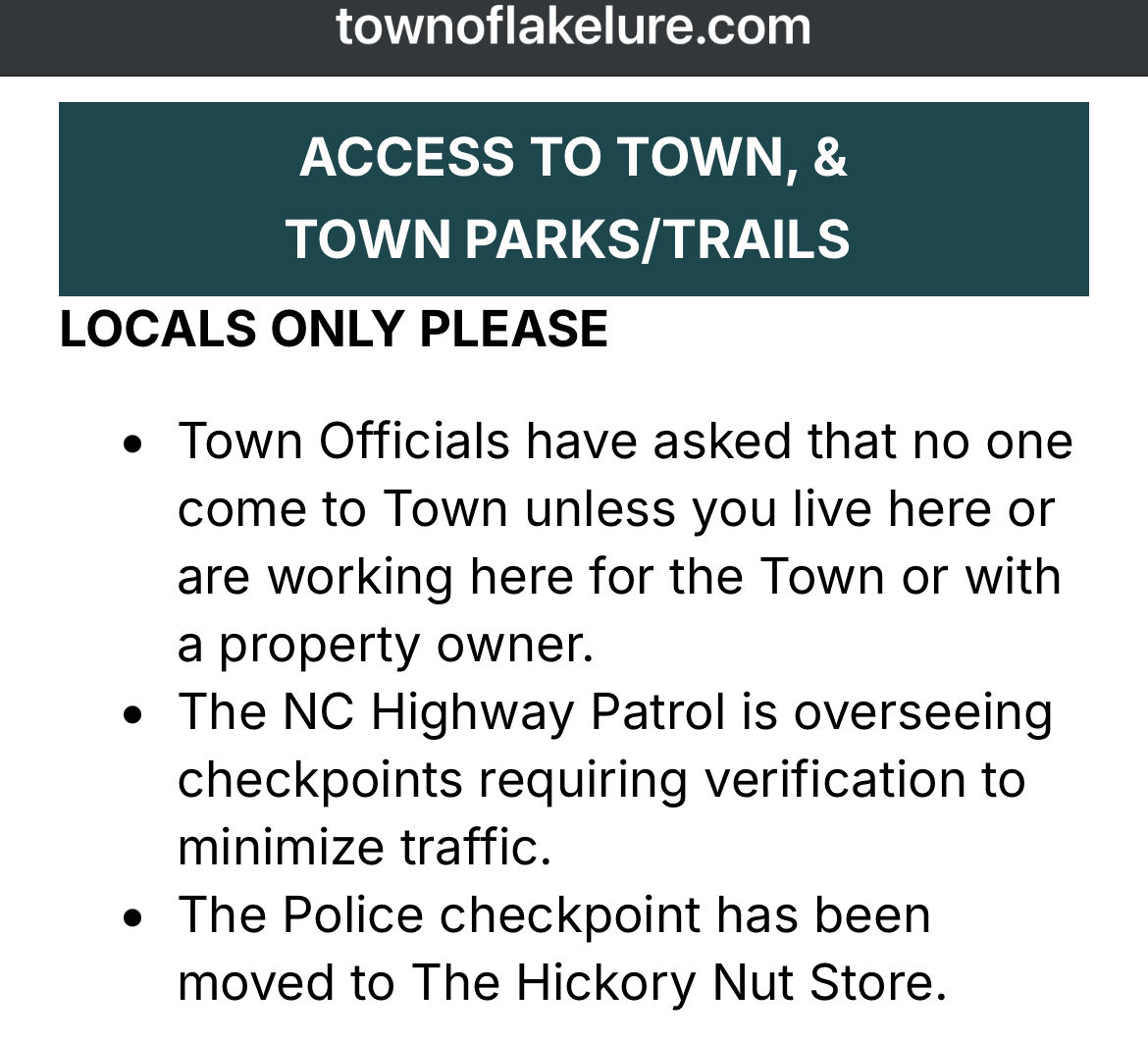Checkpoint Chimney Rock: Police prevent 'unauthorized individuals' from accessing the town more than three weeks following Hurricane Helene
Front section of Burntshirt Vineyards collapsed Friday amid ’dangerous conditions,’ town officials say
To my new subscribers (and a reminder to loyal readers), welcome to Cops & Congress, where facts come first, followed by in-depth commentary and analysis. Paid subscribers enjoy exclusive access to scoops requiring investigation of public records. Your support directly funds the detailed research behind my independent journalism. (ICYMI: Six reasons to support my independent journalism)
In the wake of the devastation caused by the recent hurricane, Chimney Rock Village leaders are calling on residents and visitors to respect the safety restrictions in place to ensure a swift recovery and the protection of emergency personnel.
The front section of Burntshirt Vineyards Bistro collapsed on Friday, according to a public notice issued by Chimney Rock Village officials late Sunday. “Burntshirt Vineyards in Hendersonville is now open during regular hours. Burntshirt Vineyards Tasting Room & Bistro in Chimney Rock will remain closed for the season,” the business said on its website.
The collapse has intensified already high alert levels in the region, as village officials stress the seriousness of the dangers posed to the public. The road stretching from Chimney Rock Village westward to Bat Cave is now restricted to authorized personnel only. According to the public notice, “Unauthorized individuals are hampering relief efforts, debris removal and road construction, as well as placing themselves in danger.”
"This was a sobering reminder of the catastrophic damage our village has suffered," the notice emphasized, underscoring the potential dangers that still loom in the aftermath of the recent storms that have impacted the community. The area had heavy rain before Helene hit, with the Rocky Broad River already flooding by Friday morning, September 27.
It happened the same day that Deanne Criswell, FEMA Administrator, visited the town “to offer support and suggestions on public and private assistance,” officials said.
As teams work to stabilize the area, officials are considering additional measures, such as increased monitoring and legal consequences for those who violate the restrictions, to prevent interference with recovery operations.
On October 6, town officials said, "Do not walk around to sightsee or take photographs as this is a disaster area." The statement underscores the risks posed to both the public and recovery teams, who are working tirelessly to restore essential services and infrastructure.
Although the First Amendment protects the right to record in public, officials emphasize that public safety must come first in a disaster zone. North Carolina’s one-party consent laws permit individuals to photograph or record in public spaces, but local authorities urge caution and responsibility during this critical period.
Following the town council meeting last week, I saw two state highway patrol SUVs parked at the Hickory Nut, at 215 Main St., preventing “unauthorized individuals” from the town.
North Carolina Highway Patrol First Sergeant Christopher Knox explained the initial efforts by state troopers to secure the area in an email today to Cops & Congress, "We were originally requested to help secure the area due to ongoing safety concerns (infrastructure). Access to the area was originally limited to those who were residents of the area to ensure response/recovery efforts were not hampered by onlooker traffic. I am told we are not currently working a static post in that area.”
Lake Lure officials wrote on their website, “The NC Highway Patrol is overseeing checkpoints requiring verification to minimize traffic.” It’s not the first time they have said it. Officials wrote the same phrase on sixteen news releases reviewed by Cops & Congress.
Town and state officials have not specified who they consider to be an “unauthorized individual,” but town officials implemented a pass system for residents and business owners. However, Mayor Peter O’Leary said contractors were allowed in at certain points during recent town meetings on October 10 and October 15. There has been a large military presence. While several businesses and homes were washed away by the Rocky Broad River, structures remain.
Residents and business owners have expressed frustration on social media that they need to access their homes to prevent mold and other issues. There have also been concerns about looting by people hiking into town from the west and the north. Police sources tell me there were two attempted looting incidents but they were “quickly thwarted,” due to a homeowner being legally armed and a fireman who was nearby. It’s unclear if anyone has been arrested for looting in the area, I have not seen anyone charged with that crime in recent Rutherford County Sheriff’s Office Detention Center records.

Opinion & Analysis
Cops & Congress Commentary: Checkpoint Chimney Rock – Protecting Public Safety or Overreach?
In response to the recent collapse at Burntshirt Vineyards and ongoing recovery efforts in the Chimney Rock Village area, local law enforcement has continued with a police checkpoint to prevent unauthorized individuals from entering the town. It was originally set up miles to the east to prevent access to Lake Lure and Chimney Rock in the immediate aftermath of the hurricane. The checkpoint location now, which blocks access to the road leading from Chimney Rock west to Bat Cave, is designed to keep people out of hazardous zones where debris removal and road repairs are still underway. However, this isn’t the first time local authorities have implemented strict access controls in the area—and as with any such measures, questions of overreach arise. Federal law, including the constitution, specifically guarantees the freedom of movement and the freedom of the press.
Previously, checkpoints were enforced even more stringently near Lured Market & Grill, near the town beach. These restrictions went beyond ensuring safety, extending to limiting curiosity-seekers and preventing people from taking photos of damaged or closed-off areas. In my view, this level of control bordered on overreach. On September 29, I experienced this firsthand when a Lake Lure police officer threatened me with arrest simply for being near the restricted area, despite following all instructions and not engaging in any unsafe behavior. That incident raised an important question: Where do we draw the line between public safety and unnecessary restriction?
While safety must be a top priority—particularly in the aftermath of events like the recent collapse weeks after the hurricane—there’s a real risk that checkpoints become more about limiting public transparency than protecting it. There is a legitimate public interest in seeing and understanding the damage firsthand, and photography has long been a tool citizens use to document their surroundings. Blanket prohibitions on access and photography may ultimately erode trust between the community and law enforcement, especially when such restrictions appear heavy-handed or lacking in clear justification.
The current checkpoint in Chimney Rock serves a critical purpose, no doubt. The area remains hazardous, and unauthorized individuals could hinder efforts to clear debris and rebuild vital infrastructure. Yet, as was the case near Lake Lure, we must ensure that these checkpoints don't go beyond what’s necessary. Law enforcement must strike a balance—protecting recovery efforts without stifling transparency or infringing on people’s right to document what’s happening in their communities.
Ultimately, any checkpoint—whether at Chimney Rock or Lake Lure—should be rooted in the principle of proportionality. As long as the checkpoint is in place, law enforcement must remain transparent about the rules governing access, ensure those rules are applied fairly, and avoid the kind of overreach that leads to community distrust. After all, residents and visitors alike have a vested interest in seeing Chimney Rock recover safely and fully. Respect for the public’s role in that process—while keeping safety at the forefront—is key to moving forward together.
Editor’s note: This article has been updated.
🏛️ All those mentioned are presumed innocent until proven guilty.
Learn more about this newsletter and my background. I am guided by the Society for Professional Journalists Code of Ethics. Follow me on X (Twitter), Facebook, Linkedin, Instagram, TikTok, and YouTube. Send constructive criticism, fan mail and tips with public documents for future stories: CopsandCongress@gmail.com.
Interested in sponsoring a future issue of Cops & Congress? Email me with your ideas and budget.
(Free subscribers: Upgrade to paid to leave a comment below and don’t miss out on exclusive content.)





